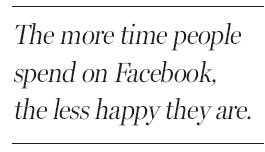Status anxiety via status updates
Updated: 2012-03-04 07:47
By Anita Patil (The New York Times)
|
|||||||||||
"I don't really like my friends," complains Veronica Sawyer (Winona Ryder) in the 1989 film "Heathers," a cult classic about cliques, suicide and jocks in high school. Jason Dean (Christian Slater) responds: "I don't really like your friends either."
Those lines were spoken long before Facebook or Foursquare. Imagine how we feel now, when we are bombarded by our friends' thoughts, feelings, desires and destinations through a constant stream of status updates, links, tweets and photos. Jealousy, annoyance and resentment can bubble up.
"I had to stop following certain friends because I was constantly seeing them tweet about all the parties that I wasn't invited to!" Laurie David, an author and Hollywood producer, told The Times.

A study in January in the journal Cyberpsychology, Behavior and Social Networking found that the more time people spent on Facebook, the happier they perceived their friends to be and the sadder they felt as a consequence.
Why are you at home when social networking alerts inform you that your friends are at a bar or restaurant? Feelings of anxiety, regret and inadequacy flare up, a combination that Jenna Wortham of The Times describes as FOMO, or "fear of missing out."
The billions of updates can provide amusing, or often irritating, glimpses into the activities of friends, enemies, colleagues and exes. Baby videos, vacation photos and political statements you don't agree with can feel force-fed. So just defriend, right?
We do it in real life. Psychologists consider it an inevitable life stage where people achieve enough maturity and self-awareness to know who they are and what they want, and which friends deserve attention and which don't, The Times reported. The pruning process even has a clinical name: socioemotional selectivity theory.
But online, many find it hard to resist going through, well, other people's stuff. "I had this bizarre, voyeuristic habit of scrolling through people's travel photos online and then feeling like, 'Why haven't I walked the Great Wall of China?' And guilt: 'I should be taking my son to Spain.' I don't even like to travel!" Laura Zigman, a novelist, told The Times.

But users aren't just aggravating one another; the negative feelings extend to the creators of the software. Feeling jilted after Facebook filed for one of the most lucrative initial public offerings in history, some were asking, Where's my cut? "Without me, and the other 844,999,999 people poking, liking and sharing on the site, Facebook would look ... bleak, desolate and really quite sad," Nick Bilton wrote in The Times.
One commenter on Mark Zuckerberg's page after the I.P.O. filing, wrote: "Why open Facebook stocks just for the Elite! Give the opportunity to all that helped you make facebook what it is today!"
Jaron Lanier, an "innovator in residence" at the University of Southern California, worries about companies like Facebook and Twitter not paying their users while their employees get rich from free user-generated content. He told The Times that this process will leave society divided and distorted.
If it isn't already. Are we approaching the brink of one status update too many? Kevin Systrom, the chief executive of Instagram, a photo-sharing application, told The Times: "We as humans can only process so much data."
And so many friends.
For comments, write to nytweekly@nytimes.com
Today's Top News
Rescuers race against time for quake victims
Telecom workers restore links
Coal mine blast kills 18 in Jilin
Intl scholarship puts China on the map
More bird flu patients discharged
Gold loses sheen, but still a safe bet
US 'turns blind eye to human rights'
Telecom workers restore links
Hot Topics
Lunar probe , China growth forecasts, Emission rules get tougher, China seen through 'colored lens', International board,
Editor's Picks

|

|

|

|

|

|





